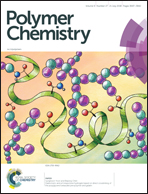Nucleophile-initiated anionic polymerization of zwitterionic monomers derived from vinylpyridines in aqueous media under ambient aerobic conditions†
Abstract
Polymerizations in aqueous medium under ambient and aerobic conditions mimic natural processes. Hereby we report an anionic polymerization of vinylpyridine (VP) based zwitterionic monomers by organic and inorganic nucleophiles in water, in the presence of air and at room temperature. The polymerization was initiated by a nucleophile, propagated via a carbanionic mechanism, showing living characteristics. This is a unique example of anionic solution polymerization of a vinyl monomer progressing in aqueous media. Zwitterionic polymers of different chain end functionalities including radically polymerizable vinyl groups were synthesized by utilizing different nucleophiles as the initiator. Furthermore, the electron charge distribution of the monomer and propagating species and the polymerization energies of different polymerization steps were calculated using density functional theory (DFT) calculations and the active–dormant resonance hybrid structure of the propagating carbanion was validated with DFT. This investigation opens up a new, facile way of synthesizing functional zwitterionic polymeric materials, novel functionalization possibilities of surfaces containing nucleophile groups and a novel way of synthesizing macromonomers.



 Please wait while we load your content...
Please wait while we load your content...